 Murphy, Michael B. (2024 - Present)
Murphy, Michael B. (2024 - Present)
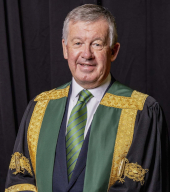 Professor Michael B. Murphy was elected Chancellor of the National University of Ireland on 17 October 2024.
Professor Michael B. Murphy was elected Chancellor of the National University of Ireland on 17 October 2024.
Professor Murphy was born in Co. Cork and educated at St Finbarr’s College, Farranferris, Cork. He went on to receive his medical degree from University College Cork. He held roles at St Finbarr’s Hospital, UCC, and St Vincent’s University Hospital, University College Dublin, then conducted postgraduate studies in London at the Royal Postgraduate Medical School (Imperial College).
Professor Murphy was previously President of the European University Association, former President of University College Cork, Dean of Medicine, Professor of Clinical Pharmacology and physician. He held research/faculty positions at the University of London and The University of Chicago for 12 years.
Professor Murphy has chaired the Global University Associations Forum, Steering Group of the Annual European Learning and Teaching Forum and the International Advisory Board of U-Multirank (the EU university grading system). In Ireland, he has served on the Health Research Board (chair) and board of the Health Service Executive, and has previously served NUI as Senate member and Vice-Chancellor.
 MANNING, Maurice A. (2009 - 2024)
MANNING, Maurice A. (2009 - 2024)
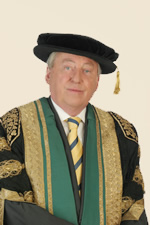 Dr Maurice Manning was elected Chancellor of the National University of Ireland on March 12, 2009. Dr Manning is the fifth Chancellor of the University since its establishment in 1908.
Dr Maurice Manning was elected Chancellor of the National University of Ireland on March 12, 2009. Dr Manning is the fifth Chancellor of the University since its establishment in 1908.
Dr Manning was born in Bagenalstown, Co Carlow, educated at de la Salle Schools Bagenalstown, Rockwell College, University College Dublin and the University of Strathclyde.
He has been a member of the NUI Senate for twenty seven years, having been elected on the graduate panel in every election since 1982; he served on the Governing Authority of UCD from 1979 to 2008; he spent much of his academic career in the Department of Politics at UCD where he established a reputation for his teaching, his closeness to students and his publications. He has published widely and is currently Adjunct Professor in the School of Politics and International Relations at UCD. He is also currently Chair of the Publishing Committee of the Institute of Public Administration.
Dr Manning has served in both Dáil and Seanad Éireann. During that time he was a member of the New Ireland Forum, and the British-Irish Inter-Parliamentary Body. He was both leader of Seanad Éireann and Leader of the Opposition in that House. Maurice Manning has also been President of the Irish Human Rights Commission and was Chair of the European Group of National Human Rights Institutions..
 FITZGERALD, Garret
(1997 - 2009)
FITZGERALD, Garret
(1997 - 2009)
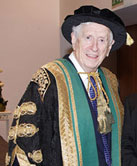 A native of Dublin, Garret FitzGerald was born in 1926. He obtained a BA (1946) and a PhD (1968) from University College Dublin and also graduated from Kings Inns, Dublin and was called to the Bar.
A native of Dublin, Garret FitzGerald was born in 1926. He obtained a BA (1946) and a PhD (1968) from University College Dublin and also graduated from Kings Inns, Dublin and was called to the Bar.
Having worked in Aer Lingus for a number of years, Garret FitzGerald began a new career in 1958 as an Economic Consultant and Academic. He lectured in Economics and in the Affairs of the European Economic Community (EEC) at University College Dublin. This was a period of economic expansion in Ireland, and in 1959 he was elected as the first Chairman of the Irish Council of the European Movement.
He entered politics in 1965 upon his election to the National Senate, and was subsequently elected to the Dáil in 1969. His political career has had many high points: he was the leading spokesman in favour of joining the EEC (82% voted yes) in the 1972 referendum; in 1973, he was appointed Foreign Minister in a new coalition Government; in 1975, as Foreign Minister he led the first Irish Presidency of the European Council of Ministers; in 1977 he was unanimously elected as Leader of his Party (Fine Gael); in 1985 he successfully negotiated the Anglo-Irish Agreement with British Prime Minister, Margaret Thatcher, whereby the Irish Government secured an unprecedented role in relation to the protection of the interests of the Nationalist Community in Northern Ireland.
Dr FitzGerald was twice elected as Taoiseach - in 1981 for nine months and in 1983 for four and a half years. In 1987 he resigned as leader of the Fine Gael party, and in 1992 retired from the Dáil.
He remained an active and influential figure in the public life of Ireland, continuing regularly to address gatherings and take part in radio and television programmes. He wrote a weekly newspaper column until his death on 19 May 2011.
 WHITAKER,Thomas Kenneth (1976 - 1996)
WHITAKER,Thomas Kenneth (1976 - 1996)
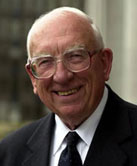
T K Whitaker, a native of Rostrevor, Co. Down was born in 1916, educated at the Christian Brothers' School, Drogheda, and obtained a Masters degree in Economic Science from the University of London by private study. He rose, with great distinction, through the ranks of the Civil Service and at the age of 39 he was appointed secretary to the Department of Finance. Ireland in the 1940's and '50's was in the grip of deep economic depression, and Whitaker's vision as an economist culminated in the publication in 1958 of 'Economic Development' a study upon which the first programme for Economic Expansion in Ireland was built. This publication became known as the 'grey book' and marks a turning point in Irish economic history.
Whitaker's illustrious career spans a period of political, historical and educational change in Ireland: he arranged and attended the historic meeting at Stormont between Sean Lemass and Terence O'Neill in January 1965; he retired from the Department of Finance in 1969 to become Governor General of the Central Bank; he was nominated to Seanad Eireann in 1977 and 1981 and was a member of the Council of State, 1991 to 1998; as President of the Royal Irish Academy, he was an ex officio member of the Board of Governors and Guardians of the National Gallery of Ireland from 1985 to 1987. Earlier, his immense contribution had been acknowledged by the National University of Ireland when he was conferred, in 1962, with a DEconSc.
Upon the death of Éamon de Valera in 1975, the position of Chancellor of the National University of Ireland became vacant. Dr Whitaker was elected Chancellor by Convocation on May 5th 1976 and retained this position until he resigned on December 31st 1996.
Dr Whitaker Passed Away on January 9th, 2017
 DE VALERA, Eamon (1921 - 1975)
DE VALERA, Eamon (1921 - 1975)
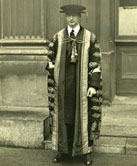
Eamon de Valera was born on October 14, 1882 in New York City of an Irish mother and a Spanish father. When his father died in 1885, he was sent to live with his mother's family in Bruree, County Limerick, Ireland. He received his education at Blackrock College and the Royal University in Dublin. After his graduation in 1904, he taught mathematics.
Eamon de Valera is acknowledged to be one of the major political figures of modern Ireland. His involvement at the very heart of the emergence of the Irish Free State and later of the new Irish nation as defined in Bunreacht na hÉireann, (the Constitution of 1937) is well documented. He narrowly escaped execution after the Easter Rising in 1916; He was sentenced to life imprisonment but in 1919 made a dramatic escape from Lincoln Prison in England. Civil War followed the ratification of the Treaty which brought about the partition of the island of Ireland. De Valera and his Republican followers were defeated, and again he was imprisoned for about a year.
Eamon de Valera was the founder of the Fianna Fáil Party in 1926; he became Taoiseach in 1932, and was continually re-elected as Taoiseach until 1948, the year Ireland officially became a Republic. After this period, he was Taoiseach from 1951 to 1954 and from 1957 to 1959 when was elected President of Ireland for a seven-year term; in 1966 he was re-elected, at the age of 84, for a further seven years. Eamon de Valera was elected Chancellor of the National University of Ireland in 1921 and remained so until his death in August 1975.
 WALSH, William J. (1908 -1921)
WALSH, William J. (1908 -1921)
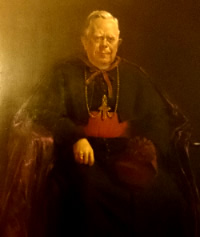
William J. Walsh was born in Dublin in January 1841. He undertook third-level studies at Catholic University under Cardinal Newman and continued, in clerical studies, at St. Patrick's College Maynooth where he was later Professor of Theology (1867 - 78), Vice-President (1878) and President (1881). He was appointed Archbishop of Dublin in 1885.
He was possessed of great energy and a formidable intellect. The breadth of his interests and abilities may be gauged by the diverse subjects of his publications: Catholic education, Gregorian music, and bimetallism. Living, as he did, in a period of intense political ferment, Archbishop Walsh took an active part in public affairs - educational, political and social. He was appointed the first Chancellor of the newly established National University of Ireland in 1908 and died in office in April 1921.






















